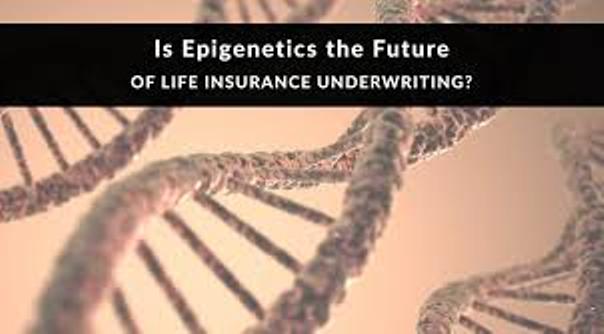Introduction
The insurance industry spends quite a bit of time and money evaluating the physical condition and mortality of applicants. The underwriting processhas long followed thesecumbersome,time consuming, and expensive traditions. Epigenetics potentially opens a door to simplifying the underwriting process by eliminating the need for physical exams and the use of convoluted health questionnaires.
What is Epigenetics?
Epigenetics is the study of changes in organisms brought about by modification of gene expression, rather than alteration of the genetic code in the form of DNA.It can be viewed as the biological answer to the question asking how the environment can override the determinism of our DNA.
The epigenome tells brain cells to behave as brain cells and not liver cells. In addition, the various epigenome, when exposed to stressors, can suppress the genes ability to fully express itself. For example, there are genes that will prevent the uncontrollable cell division that causes cancer.However, if that individual is exposed to enough toxins, the epigenomemay stop the gene from preventing the cancerous cell divisions. The DNA is unchanged, but the epigenome has suppressed its ability to function. The epigenome can be viewed as a light dimmer, in the sense that the level to which it is applied will determine the magnitude of the DNA’s ability to express itself.
In short, genetics will influence outcomes, but environmental factors (behavior, lifestyle, etc.) are also significant and may,at times, override genetic risk factors.
Epigenetic Law/Ethics
Currently, the body of epigenetic law, by itself, is quite limited. Many experts believe that genetic law also applies to epigenetics. However, there is a clear and well-defined difference between genetics and epigenetics.In general, genetics looks forward based on an individual’s immutable DNA, while epigenetics looks backward at the sum total of an individual’s exposures.
US Federal Law is primarily based on the Genetic Nondiscrimination Act of 2008 (GINA) which prohibits any discrimination based on genetics. This includes the use of genetic information in hiring or in consideration of health insurance. Note that the law’s limitations do not apply to life insurance or long-term care and disability insurance. Genetic testing (as well as epigenetic testing) is unregulated in these areas.
Typically, an insurer is prohibited from imposing a surcharge based on a genetic trait unless an actuarial justification can be shown to exist. In addition, testing must include informed consent. The insurer must disclose why the test is being done and how the results are being used. Confidentiality requirements must be carefully adhered to so that personal information and privacy are protected. The insurer must also allow for re-testing if the initial test leads to denial.In general, state laws range from allowing market-based, competitive solutions to laws based on actuarial standards to outright prohibition.
Although it is not legally clear at this time, many experts believe that epigenetic law will follow genetic law, at least in principle.
The Current State of Epigenetic Testing
Insurance companies plan to use epigenetic testing to better evaluate mortality, true smoking and drinking behavior, and other correlating underwriting factors. A number of companies are working on epigenetic test kits that will aid insurance companies or individuals in this evaluation.
The most common test, currently, measures the difference between biological age and chronological age, which suggests accelerated or decelerated aging. The cost is relatively inexpensive but does raise a number of industry concerns. The test does not cover alllayers of epigenetic modification. In addition, the sample sizescommonly seen may not scale to allow for generalized conclusions. It is also unclear, if methodological differences across companies lead to comparable results. There are also scientific complications in concluding that results in blood samples are identical to results in tissue samples.
Based on the perceived predictability of epigenetics, we believe that it will enable innovative product development at a competitive price without extensive medical testing. As a result, the epigenetic impact on underwriting is expected to reduce the long issue period by eliminating the need for questionnaires and physicals.
Unfortunately, for the insurer,there is nothing preventing an individual from getting his own epigenetic test done, thus exposing the insurer to anti-selection. Individuals who are privately tested and discover they are at risk are 4 times more likely to purchase insurance.
Despite these potential limitations, researchers believe that epigenetics will yield quick, reliable, cost-effective results that will be used extensively across the insurance industry.
Advantages and Disadvantages of the Process
The benefits of the process are apparent for both parties. Epigenetic markers do better job of assessing significant risk factors (smoking and alcohol usage) plus general overall mortality. This includes the ability to estimate a biologic age compared to the individual’s chronological age and thus assess the rate of aging. This is an advantage to both parties sinceinsurers that can better estimate mortality can do a better job of pricing a policy competitively while, in many cases, putting the customer into a more favorable rating category than the blood test and questionnaire.
It is also expected that as epigenome analysis teaches us more about the factors that influence long-term health, insurers will be able to collaborate with insureds by offering dividends for healthy lifestyle decisions. They could possibly even offer discounts for subsequent discounts.
Another area of controversy looks at the epigenetic history. If the epigenome application could wipe out a “problematic” background, would one choose to do it. Would you want to override your family history of mental illness or depression? Even more controversial would be erasing a child’s painful memories.
Conclusion
Insurers have a chance to use epigenetic data in a manner that will enable them to better evaluate prospects and as a result become more competitive. We have shown how epigenetic testing can benefit the value chain (product development, underwriting, etc.)and enable customers to benefit from the superior evaluation. However, while incorporating these new ideas into the insurance process, the insurer must not overlook the risks from the dreaded A-word (anti-selection).


